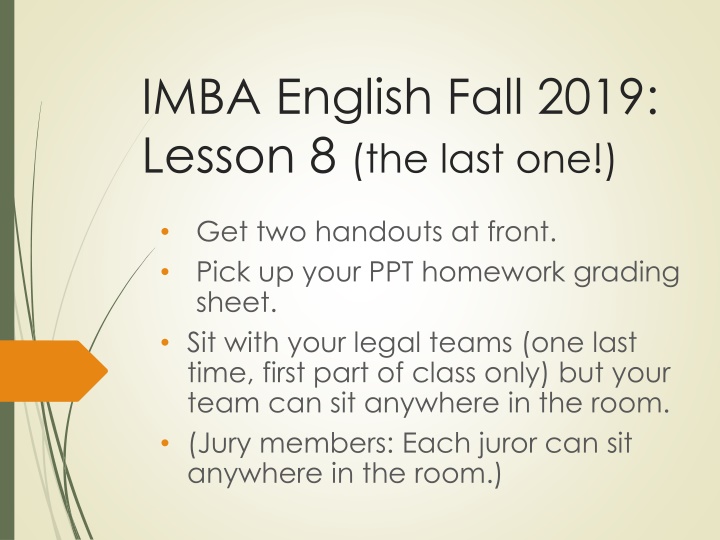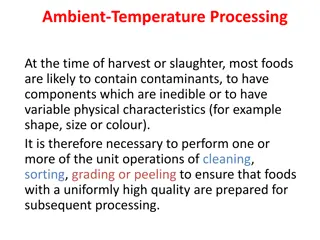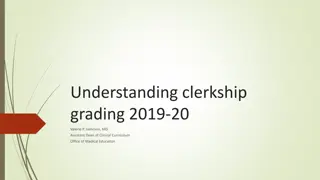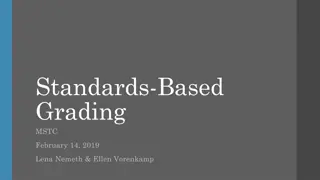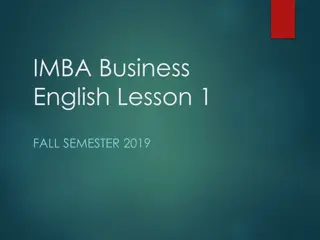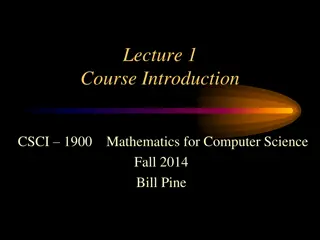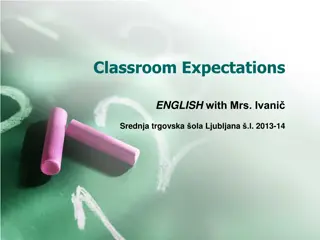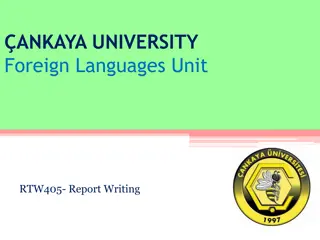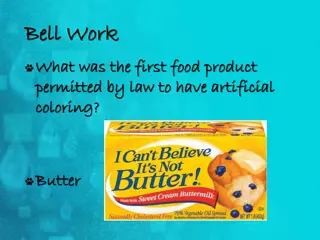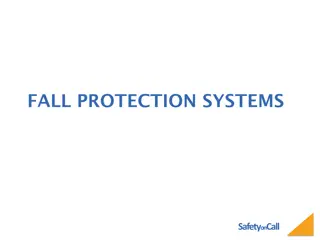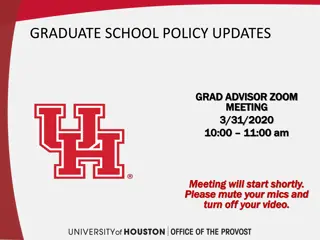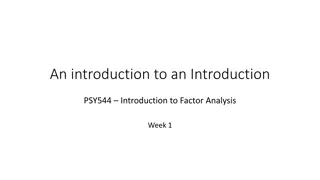IMBA English Fall 2019: Lesson 8 Course Overview and Grading Details
Course outline of IMBA English Fall 2019 Lesson 8 includes a breakdown of the grading scheme, details on assignments, participation, performance in court case activities, and final exam structure. The summary also emphasizes the importance of following instructions for PPT submissions and how to address grading mistakes.
Download Presentation

Please find below an Image/Link to download the presentation.
The content on the website is provided AS IS for your information and personal use only. It may not be sold, licensed, or shared on other websites without obtaining consent from the author.If you encounter any issues during the download, it is possible that the publisher has removed the file from their server.
You are allowed to download the files provided on this website for personal or commercial use, subject to the condition that they are used lawfully. All files are the property of their respective owners.
The content on the website is provided AS IS for your information and personal use only. It may not be sold, licensed, or shared on other websites without obtaining consent from the author.
E N D
Presentation Transcript
IMBA English Fall 2019: Lesson 8 (the last one!) Get two handouts at front. Pick up your PPT homework grading sheet. Sit with your legal teams (one last time, first part of class only) but your team can sit anywhere in the room. (Jury members: Each juror can sit anywhere in the room.)
Lesson 8 Outline Course Grading Scheme and homework Moulton Case debriefing Course Review Look at last year s exam Oral final info
Course Grading Scheme 20%: Assignments 20%: Participation in regular class activities such as discussions including attendance, being on time, behavior 25%: Performance in the court case activity of Lessons 6-7 skills in this simulated practical situation assignments related to the activity 35%: Final exam: Written part = 15%, Oral part = 20%
20% for Assignments Four Homework Assignments 6% = Love/Hate/Neutral [Returned] 1% = Discussion Ideas [Handed in = 1%, particularly interesting idea = 2%] 7% = Fallacies [Returned by email] 6% = PPT Resume [Returned today]
6% for PPT Resume [Returned today] Check my addition and talk to me today if I added wrong. Check that I saw everything you think was in your PPT resume. Feel free to point out what you think are my errors. Use email: Specify which slide# in the original file you sent to me and explain. Average: 77.7% (ignoring two missing) Top grade: 96% (three people tied)
Comment: Dont annoy me Remember I asked you to name your files in a specific way? name and good / bad Guess what happens if I save the attachments of all students to one folder when you call your file Bad.pptx ? I wasted about an hour of time because of people who did not follow instructions, so I took marks off. I also wasted time because of having to do strange stuff to download some files. It was annoying so I wouldn t hire you.
If you think there was a grading mistake on your PPT assignment Email me a scan/photo of your grading sheet. (I don t need the PPT files I ve still got the ones you submitted.) In the email, tell me what I missed and what slide(s) I should check. I m happy to correct any mistakes I might have made. (I got tired checking so many and could easily have missed stuff.)
25% for Moulton Case Moulton Case grades I recorded legal team grades during each stage on court days. I need to tabulate these and grade the 500-word statements from strategists and jury members. Grades for everybody will be sent by email before Tuesday (the day before the exam)
The Moulton Case General Comment: You need to keep in mind the basis for the decision! The court has to decide which claimant Lord Moulton would wish to inherit his estate, based on the known facts and the arguments of claimants in court.
Moulton Case: Strategists reasons vs. Jury Members comments See the combined documents on the course website. Access through the IMBA link at http://staff.ustc.edu.cn/~msherk Sit with your legal team and discuss the document for your case. Did the jury get it or miss the point ? What should you have done? Jury members, walk around the classroom talking to teams and answering questions
Moulton Case: Retrial (by Mob?) Form discussion groups: All claimants in one group, Lawyer1s in one group, etc. Stand with your group somewhere. (Jurors, spread yourselves out so each team has at least one juror.) You are no longer part of a legal team. Free-for-all!! Debate who should get the estate. You may argue for any claimant, whichever you personally prefer.
After the 5-minute Break Sit anywhere you d like (as long as it s in the room!)
What if Jane changed her mind and DNA testing proved she was Moulton s biological daughter. The orphanage had argued that by NOT removing the message saying The Moulton family will never let this orphanage fail , Moulton was actually making a will. Lady Trent had a note from Moulton, just before his death, saying If you forgive me, I ll give you all my estate.
Expressing Opinions What do you love? What do you hate? What are you neutral about?
Professionalism: Spelling The English you produce should have NO spelling mistakes. Use a computer program to check your spelling. Any word processor will check for you, but an independent spellchecker helps too. Beware of MS Word Do not check spelling setting. Bad spelling implies carelessness!
Professionalism: Grammar Grammar mistakes are more forgivable than spelling mistakes but still You may use point form in places, but make sure the meaning is clear! Use a computer program to help Word s grammar/wording checker Grammarly.com free account
Grammarly system (free!) Good, but not completely trustworthy misses some mistakes flags some good things as mistakes suggests some things that are wrong! Also checks spelling Also checks punctuation Suggests better wording Pay attention to it, but don t trust it completely
Punctuation spacing problems for [.,;?!], no space before and one space after Correct: x, y His brother, John, was a bad man. Wrong: x , y x ,y for [:] Correct: I like fruit: apples, Wrong: I like fruit : apples, Correct: The ratio 2:1
Punctuation spacing problems for [.,;?!] - no space before and one space after for [:] depends on context brackets: opening space before, closing space after (unless followed by punctuation) Correct: John (and his son) like I like cats (except his cat). Wrong: John ( and his son ) like Quotations marks: Similar to brackets but some exceptions
Beware of Non-English fonts! E.g. Chinese fonts do have English letters and punctuation symbols but the spacing is wrong! Chinese font symbols are all equally wide, so ( looks like ( . extra space looks ugly and wrong in English text Use English fonts for English text!
Pronunciation Nothing about pronunciation on the written test I ll be listening for pronunciation in the oral exam component
Culture and Worldviews In the international setting, you ll encounter many worldviews Worldviews are likely to affect policies and your business dealings in certain locations Be ready to talk about worldviews Know your own worldview and how it affects you. Know that there will be much that you don t know about other worldviews and might not even think to ask! Use gentle wording (see lesson handout) to avoid offending
Review: Worldviews and Instincts Our instincts often reflect our own worldview, rather than carefully considered opinions. Why do I think the way I do? Why did I never think to ask that question?
The Western Worldview Cultures of Europe, UK, North America, Australia 3 main influences: Greek thought/reasoning logic, precision, beauty of thought physical matter is dirty , evil The Bible intrinsic worth of each human Rule of Law vs. Rule of Man Shakespeare English language, ideas
Basic elements of worldviews Origins: Where did we come from? (humans, universe, etc.) Does the supernatural (e.g. God, gods) exist? If so, how should we relate to it / he / them? What is morality? Absolute or defined by society? How are humans different from animals? Are all people of equal worth? Old? Young? Rich? Poor? What is the purpose of my life? What makes life worthwhile? What things/actions/ideas are Good? Bad? Neutral? Is it good to be different? fit in with a crowd? Are new or old things better?
Exercise we did: Compare your triple s worldviews Individually: Make a list of things that you believe are true about the worldview you believe most people have in your home country. List things that are good List things that are bad As a triple: Compare your lists and discuss the differences Are these differences important? Do these differences affect business success in your country?
Offensive and inoffensive language People are very sensitive about beliefs in their worldview Some cannot talk about them because they cannot handle disagreement about something so important What are ways you know to avoid offending people when you DO have to talk about such things?
Hints Know your own worldview well enough to give reasons for your beliefs if asked. Not Because I m right Recognize that questions are not necessarily challenges. Never mistake for malice that which can be adequately explained by ignorance. Recognize that intelligent, rational, good people may hold opposite viewpoints. Do NOT assume intelligent = agrees with my worldview Do NOT assume disagrees with me = deluded or evil
Represent your societys worldview to your triple Respectfully disagree with each other. I believe It seems to me Don t you think ? Please help me understand why [you believe] Why do you believe ? (with genuine tone) Don t aim for agreement Aim for understanding (e.g. so you can do business) Are you personally able to agree to disagree ? Can you lose a vote gracefully about something that is important to you?
Worldviews: Environmentalists vs. Productionists All environmentalists know that GDP is important; they just think it is less important than preserving the environment. Money does no good if you can t breathe. All productionists know that the environment has to be good enough for human life, but they will let it degrade significantly to improve GDP. Clean air and beautiful natural land are good, but you can t eat them.
Arguments Formal argument = <a claim that something should be believed or done> + <reasons for believing it or doing it> Needs: Clear claim Good reasons (relevant, enough)
Argument Strategies 1. Logic & Reason <facts> + <logic> = claim 2. Character & Credentials Believe the claim because of others who say you should 3. Emotion Believe the claim because of some emotion: fear, greed, loyalty, fairness, love, patriotism, pleasure, etc.
Logical Fallacies (15 in particular) Hasty generalization Missing the point Post hoc = False cause Slippery slope Weak analogy Appeal to authority ~ who believes it Ad populum (majority rules) ~# that believe it Ad hominem ~ type of person who believes it Appeal to pity Appeal to ignorance Straw man Red herring False dichotomy Begging the question Equivocation
Valid or fallacy? Not always clear appeal to pity is using the emotion strategy and may be valid depends if the pitiful thing is related to the claim false cause (post hoc): causes do happen before events; the question is whether that was a coincidence He died after I shook his hand
Valid or fallacy? Not always clear Criticism may or may not be ad hominem fallacy Depends if the criticized characteristic is related to the claim She is ugly so you should not buy from her. She is ugly so she should not be a fashion model. ad populum can be part of a valid C&C argument (combined with L&R)
Valid or fallacy? Not always clear In weak analogy , the weakness of the analogy may be debatable Finding no evidence after a careful search that could easily have produced evidence is a valid reason for saying there is no evidence. appeal to ignorance is different from appeal to lack of evidence Also, one person s ignorance does not make a fallacy.
Lets look at fallacy examples related to the Moulton case
The Laws of Murrayland about Inheritance The court has to decide which claimant Moulton would wish to inherit his estate, based on the arguments of claimants in court.
Basis for Awarding the Estate If Lord Moulton knew what the court knows from the evidence presented in this case, what would he want done with his estate? Moulton may never have known about Jane Smith s child, who may be his grandchild, but if he did know about the child, what would he have done?
Review: Logical Fallacies Examples related to the Moulton claimants I will label with one (or more) of the 15 fallacies but the particular label does not matter much. Key point: You recognize there is something wrong with the statement and why.
Why is this argument bad? If we give the inheritance to Jane Smith then we are encouraging people to make weakly- supported claims to be family members and soon our court system will be flooded with people claiming to be long-lost sons and daughters of rich people. Problems: Slippery slope Will it there really be so many claims like that? Begging the question Do you have any proof it is weakly-supported ?
Why is this argument bad? Lord Moulton liked Tim Brodie. Lord Moulton liked to use his money in various ways, some of it for fun and some of it for good causes like an orphanage he supported. Therefore we must give the estate to Tim. Problems: Red herring no logical connection between Moulton s varied money use and whether he would want Tim to inherit
Why is this argument bad? Tim Brodie and Jane Smith are young and can take care of themselves. Lydia Trent, on the other hand, is an old lady with nobody to take care of her, so she should inherit the estate. Problems: Missing the point. The point is not who needs the money, but who has the best legal case to be beneficiary. Remember: best legal case = gives best reasons that Moulton would like them to inherit.
Why is this argument bad? We cannot trust young people like Jane or Tim to do the right thing with the estate. Problems: Ad hominem =attacking the person, not the claim Why does young = untrustworthy? Hasty generalization Are all young people the same?
Why is this argument bad? Nobody can know for sure whether Lord Moulton considered Nurse Langland to be as dear to him as a relative, so how he treated her cannot determine who should inherit his estate. Problems: Appeal to ignorance The fact that nobody can read another person s mind does not mean that Moulton would not want Langland to inherit. Cannot prove does not imply false
Why is this argument bad? Lord Moulton s doctor says that the orphanage is a better choice than any of the other claimants. Problems: Appeal to authority (that isn t an authority in this context). This is trying to use the Character & Credentials argument strategy, but without the credentials. Why should a doctor know what Moulton would want to do with his estate?
Why is this argument bad? Nobody in town believes Jane s claim that she is Moulton s daughter, so she should not inherit the estate. Problems: Ad populum = go with majority opinion First, is it really everybody ? Second, is there evidence that they are right?
Why is this argument bad? Justice demands that Lady Trent must inherit the estate. It would be unfair to give the estate to anybody else. Problems: Begging the question Justice is essentially fairness, so this is just two ways of saying the same thing. No actual evidence is given. Repeating a claim does not make it true.
Why is this argument bad? All civilized people know dishonest people should be punished, not encouraged, so we cannot give the inheritance to Tim Brodie. Problems: Ad populum (majority opinion) All know? Red Herring Maybe Moulton would prefer to give his estate to a dishonest person since he was quite a wild guy himself (e.g. affairs)
